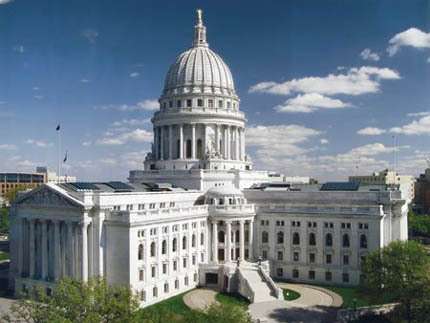Local News
Walker Signs Off on Three Lame Duck Bills

Governor Scott Walker signed off on three lame-duck bills during a stop in Green Bay on Friday. Despite national discourse calling the bills a power grab by the GOP, Walker argues there “is no power shift” happening in the executive branch. He signed the bills in their entirety – saying the priorities he focused on included protecting taxpayers, maintaining transparency, and having stability in the state government.
Part of the taxpayer protection topic included the approval of the state creating a sales tax for online retailers, to create a fair playing field for local retailers who are required to charge sales tax on the same items.
When discussing transparency, Walker addressed the concerns over making the governor pass waivers through the Legislature for approval. He says if he had been re-elected, he would have been fine with doing so – and says it’s important for the governor and Legislature to be on the same page when applying for waivers. He says working together on those things just makes sense so the two sides do not clash on the decision. He also touched on the move to codify having it noted when governors release or pardon felons in the state, again pointing to the importance of transparency.
Also in that vein of discussion, Walker argued that the move to restrict early voting is simply a move to make things fair for voters and communities across the state. Not every community has the resources to hold elections for several weeks, so Walker says creating the uniform number of days simply makes it fair and even across the state.
In addressing the stability in government, Walker again talked about the waivers – and that the bills he signed Friday only codify the practice his administration has been using for years. That includes having the Legislature take a look at them and sign off before he applies for a waiver, like the one utilized to reject federal money from the Affordable Care Act and cover all Wisconsin residents under a state plan.
When asked why the bills were only passed after the election, Walker responded saying “I’m the governor of the state of Wisconsin until Tony Evers takes office,” and continued to say “everything here could be changed a month from now” if Evers and the legislature agreed on something that needed to be altered in the bills.
When challenged about going against the will of the voters, Walker argued that the results of the election showed the will of the voters was telling both parties that “we want you guys to work it out.”
He also points out that his administration immediately stopped filling civil service positions and contracts that were not already ready to go. There were more than eighty positions approved in the recent extraordinary session.
The governor says his successor will have all of his regular appointments – including those to the Wisconsin Economic Development Corporation board, albeit those coming later than usual this upcoming September.
Walker also went on to say “I’ll never support” something that would encroach on the powers of the governor – especially the veto powers. He says the idea was floated, to which he responded that he would veto the entire bill if it was included.
Walker also expressed his interest in staying home – after being asked if he had plans to accept offers from Washington.
For anyone challenging the legislation – or calling it a GOP power grab – Walker tells them it’s important to read actually read the bills, rather than just listen to what people are saying about them.
You can find links to all of those, right here:
Upon Walker’s signing of the bills, Governor-elect Evers released a statement saying: “Today, Governor Walker chose to ignore and override the will of the people of Wisconsin. This will no doubt be his legacy. The people demanded a change on November 6th, and they asked us to solve problems, not pick petty, political fights. The people of Wisconsin expect more from our government than what has happened in our state over the past few weeks. I’ve said all along that I will put the people of Wisconsin first and work to find common ground. That’s what the people of Wisconsin deserve. We are going to turn our focus to the pressing issues facing our state like fully funding public education, fixing our crumbling roads and bridges, and ensuring health care is affordable and protects people who have pre-existing conditions.”


